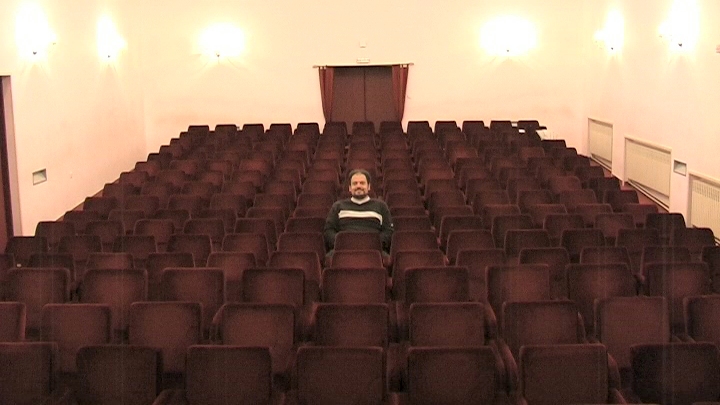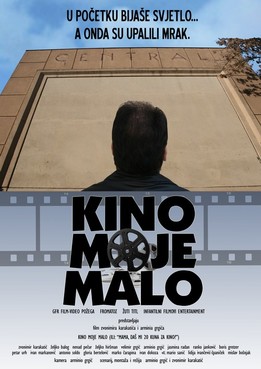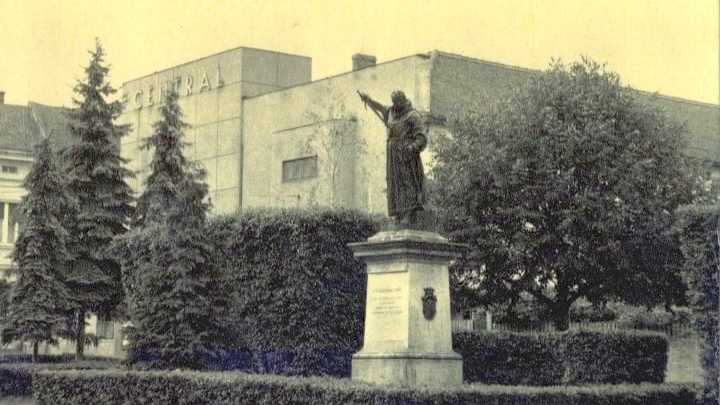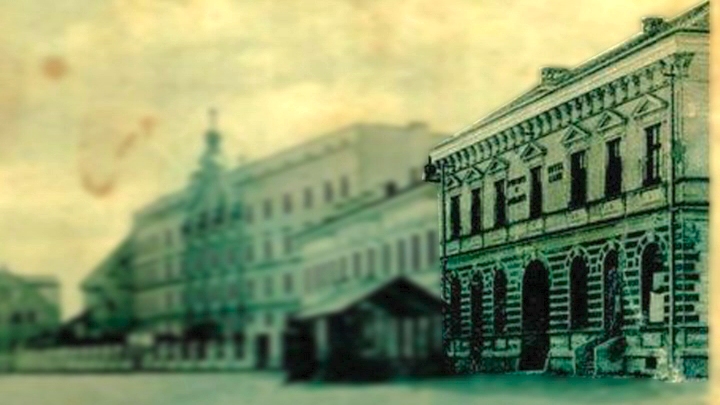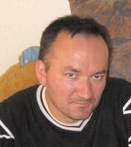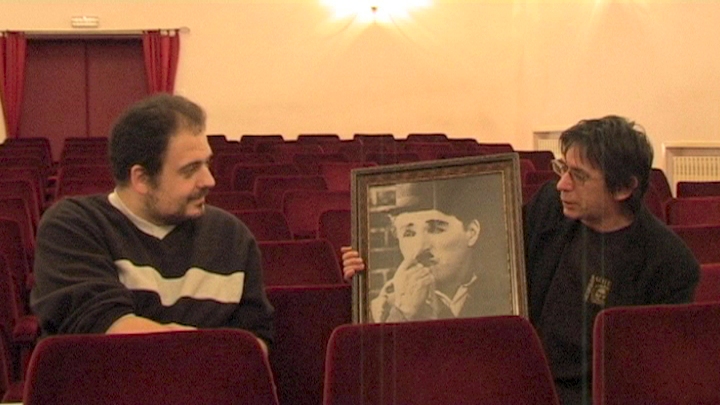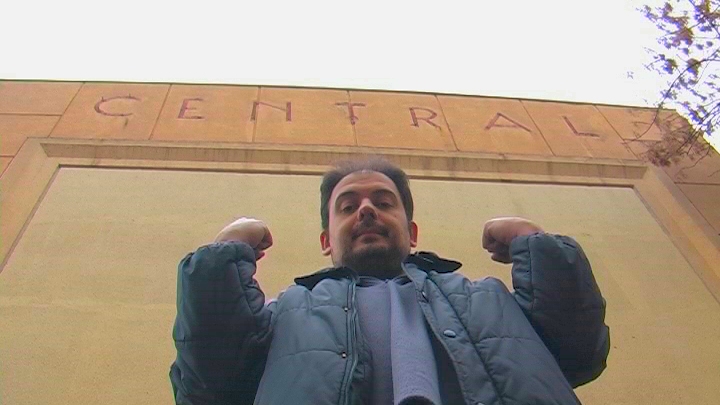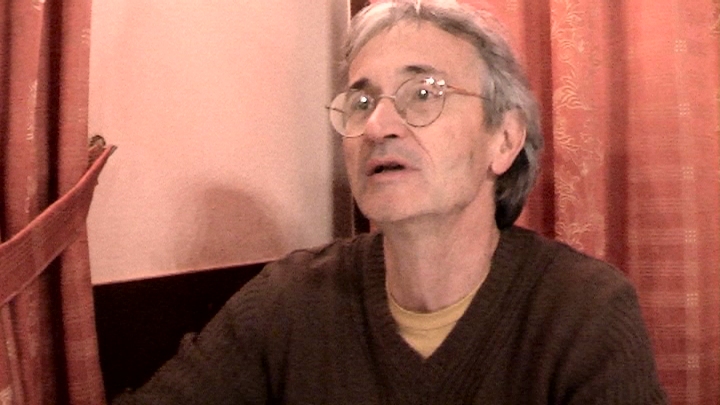ZVONIMIR KARAKATIĆ - lover of movies
I watch everything that flickers!
I’m not sure whether Reg Lancaster used these exact words, but I know that this is what he meant. He watches all types of film, everything with that nice flicker of light.
It was one of those small, almost negligible situations: twenty-something-year-old filmmakers from around the world, gathered at the UNICA film festival in Bulgaria to make a film about that festival. They wanted to show the audience (and probably themselves) what UNICA really is and what kind of people attend it. Watching this entertaining material will demonstrate to the viewers that these people are enthusiasts, cheerful, interesting and friendly folks, who like befriend people like them, regardless of nationality, political or other persuasions. Reg’s sentence was a reply to the question: “What kind of films do you like?” To me that captured this essence perfectly. In it, I recognized myself as the person I have been since my early childhood. |
This is the poster for a feature-length film made by Arminio Grgić and Zvonimir Karakatić on this topic. It is available in Croatian and also with English subtitles.
|
Požega - a town full of cinemas
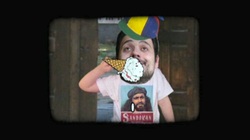
The author's early childhood.
I was born in late 1970s in the former Socialist Republic of Croatia, part of a greater federation called Yugoslavia. When I was three years old, I moved to the town that was known at the time as Slavonska Požega (to differentiate it from Užička Požega in Serbia.)
For as long as I can remember, I’ve known about “cartoons”, and when I learned to read, I applied that skill to movie subtitles. Watching movies became something of a religion: “evening prayers” after the central TV news, and several “masses” at the cinema “temple”, where preachers Forman, Coppola, Spielberg, Eastwood, Zemeckis and others explained the difference between good and evil (sometimes in a nice, but sometimes in a “go ahead, make my day” way.)
They revealed what is love and what is simply lust. They showed that seemingly powerless people can make a difference and make this world a better place, and that the biggest people in the history of mankind were just that – people. They presented it all in an apparently simple way, channeled through art and workmanlike production.
At the time, Slavonska Požega, with its population of around 20 thousand people in the central urban area, had four such movie “temples”. One of them even had two entrances, one on each side of the building. The “other” entrance was used by those who would retreat back to their prison cells after special screenings. Yes, it was the prison cinema – an ideal place to see a “pacifying” movie (no violence or stimulation to commit a crime of any kind.)
For as long as I can remember, I’ve known about “cartoons”, and when I learned to read, I applied that skill to movie subtitles. Watching movies became something of a religion: “evening prayers” after the central TV news, and several “masses” at the cinema “temple”, where preachers Forman, Coppola, Spielberg, Eastwood, Zemeckis and others explained the difference between good and evil (sometimes in a nice, but sometimes in a “go ahead, make my day” way.)
They revealed what is love and what is simply lust. They showed that seemingly powerless people can make a difference and make this world a better place, and that the biggest people in the history of mankind were just that – people. They presented it all in an apparently simple way, channeled through art and workmanlike production.
At the time, Slavonska Požega, with its population of around 20 thousand people in the central urban area, had four such movie “temples”. One of them even had two entrances, one on each side of the building. The “other” entrance was used by those who would retreat back to their prison cells after special screenings. Yes, it was the prison cinema – an ideal place to see a “pacifying” movie (no violence or stimulation to commit a crime of any kind.)
Today, with a population of around 28 thousand people including its satellite villages in the now independent Republic of Croatia, Požega has lost its prefix “Slavonska”, as well as all of its movie theaters. There are none. Zero. Zilch.
For many people this went largely unnoticed, accepted as one of those “that’s life” things. But to me and other fans of moving images, closing the last movie theater in town was (and still is) one of those disturbing moments for which no explanation is good enough. Unfortunately, many towns in Croatia experienced the same fate. Small movie theaters, often labeled as “socialist” started disappearing.
For many people this went largely unnoticed, accepted as one of those “that’s life” things. But to me and other fans of moving images, closing the last movie theater in town was (and still is) one of those disturbing moments for which no explanation is good enough. Unfortunately, many towns in Croatia experienced the same fate. Small movie theaters, often labeled as “socialist” started disappearing.
Have we given up cinema?
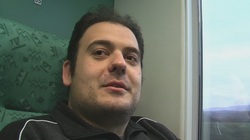
On the train journey to Zagreb.
The only place where you could go to see a movie became Zagreb, the Croatian capital, almost 200 kilometers away from Požega.
Is that far?
Yes, it is. Two hours by car from Požega.
Has it stopped and discouraged us in our efforts to see the movies in their natural environment?
NO, IT HASN’T!
Is that far?
Yes, it is. Two hours by car from Požega.
Has it stopped and discouraged us in our efforts to see the movies in their natural environment?
NO, IT HASN’T!
|
We dedicated entire weekends (and still do) to go to Zagreb with just one goal in mind: to see movies … plenty of them. And so we reached the year when we were supposed to celebrate 100 years since the first movie screening in Požega. My “movie buddy” Arminio and me decided to make a gift for all those who love film and who love our town - a feature-length amateur movie. Something to remind many people how things once were, return them to their youth for just a little while, return them to better times, at least in cinema terms.
As I was saying, Požega had 4 movie theaters. |
The main one was on my street (my fanaticism was simply meant to be), in fact, right across the street from where I lived. I was exposed to various movie posters from an early age, advertisements for animated and children’s movies, as well as Tarzan and many more. Posters adorned with smiling or serious faces, even posters with no faces or people on them. WWII movies were a part of the movie going folklore, as well as the occasional posters with scantily clad ladies bearing a caption that was not clear to me at the time - “not suitable for minors.”
On my first trip to the movies, I saw a Walt Disney animated feature. From then on, I became a fan of the silver screen and everything you can see on it, but it wasn’t until Miloš Forman’s Amadeus that this love became real and passionate. Perhaps I wasn’t old enough to clearly grasp the true meaning of the movie, but this entire “package” of music, images, entertaining scenes, paired with the contagious and psychedelic laughter of Tom Hulce, and the intimidating (to a 9-year old) scenes with F. Murray Abraham, wearing that black mask as he seeks the final atoms of Mozart’s life for the Requiem that resonated through the darkness of the movie theatre. It was “the something else” that opened “Pandora’s box” in my life, making the movies what they are to me today. There was no going back.
A blessing in disguise (or at least my parents thought) was that the movie theater was next door, so all of the staff knew me. That way I was able to see some movies for free, which was great, since I wasn’t able to afford a ticket for every movie that played. And I wanted to see them all.
On my first trip to the movies, I saw a Walt Disney animated feature. From then on, I became a fan of the silver screen and everything you can see on it, but it wasn’t until Miloš Forman’s Amadeus that this love became real and passionate. Perhaps I wasn’t old enough to clearly grasp the true meaning of the movie, but this entire “package” of music, images, entertaining scenes, paired with the contagious and psychedelic laughter of Tom Hulce, and the intimidating (to a 9-year old) scenes with F. Murray Abraham, wearing that black mask as he seeks the final atoms of Mozart’s life for the Requiem that resonated through the darkness of the movie theatre. It was “the something else” that opened “Pandora’s box” in my life, making the movies what they are to me today. There was no going back.
A blessing in disguise (or at least my parents thought) was that the movie theater was next door, so all of the staff knew me. That way I was able to see some movies for free, which was great, since I wasn’t able to afford a ticket for every movie that played. And I wanted to see them all.
Not all the movies played in this main movie theater (called Central), but also in Narodno (Municipal Theater), located on the main town square. It is now home to the town theatre. There were also some shows in Dom JNA (Yugoslav People’s Army Hall). It was much harder to get in there for free, because I wasn’t one of the regulars, so I used various tricks to see a movie even when I couldn’t afford it. Usually I would combine several old tickets of the “same color” (they came in different colors) into a “fake” one, and plowed through the crowd. I perfected this procedure so much that I was able to go to the movies up to five times with the help of two valid tickets and some adhesive tape.
Such activities became few and far between as I grew older. In high school, I was able to earn some money, so it was not a problem to buy movie tickets. However, solving one problem, at least according to Murphy’s Law, led to a new and even worse problem. First it was the war, followed by a general crisis and privatization which ruined the company that distributed movies to our movie theater. Narodno became some sort of a cultural center, and then a theater. Yugoslav People’s Army Hall changed its function several times, and it is now a university building. The prison movie theater became a place of religious worship for prisoners. With no movies to play and no investments whatsoever, the Central closed its doors. The theater building was returned to the owner from whom it was seized in the nationalization (or was it just under the management of the local government’s body in charge of culture - I don't actually know anymore.) The owner wanted to sell it, and that’s exactly what he did. He sold it to the Church. This sealed the theater’s fate in regard to its purpose: the building which was made to be a movie theater, whose façade even symbolizes the silver screen, will never again serve its original purpose. That’s life.
Such activities became few and far between as I grew older. In high school, I was able to earn some money, so it was not a problem to buy movie tickets. However, solving one problem, at least according to Murphy’s Law, led to a new and even worse problem. First it was the war, followed by a general crisis and privatization which ruined the company that distributed movies to our movie theater. Narodno became some sort of a cultural center, and then a theater. Yugoslav People’s Army Hall changed its function several times, and it is now a university building. The prison movie theater became a place of religious worship for prisoners. With no movies to play and no investments whatsoever, the Central closed its doors. The theater building was returned to the owner from whom it was seized in the nationalization (or was it just under the management of the local government’s body in charge of culture - I don't actually know anymore.) The owner wanted to sell it, and that’s exactly what he did. He sold it to the Church. This sealed the theater’s fate in regard to its purpose: the building which was made to be a movie theater, whose façade even symbolizes the silver screen, will never again serve its original purpose. That’s life.
Modern Cinema
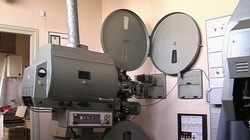
35mm projector from the old prison cinema.
People like me, who considered the movies as much more than just something to do in the evening, were left only with the screenings in Art-kino and the Croatian One-Minute Film Festival (organized by our film and video club). And then came the aforementioned trips to Zagreb.
That is when we realized that there is a different side to the movie theater. It was no longer our “socialist” place where you come for a movie and then head out into the night, but part of a huge consumerist vortex. The movies are announced, with trailers in non-stop rotation, but unlike the movie theaters I have known, everything here is loud and shiny, luring you to spend your money – from the concession stands to the very entrance into the theater which leads through an entire shopping mall. We suddenly realized the true nature of “business” in show business.
The most important thing to me here is that I am able to see the movies in cinemas which truly are state-of-the-art affairs, with a plethora of 3D, IMAX, HFR and who knows what other formats and versions. Also, they offer a dozen movies to choose from, making the decision what to see in the afternoon and the evening quite difficult. After I resolve this problem and immerse myself in a good movie in the darkness of the movie theater, everything else is less important. There’s just the movie and me. And a secret hope for a miracle that Požega will open a small, but well equipped movie theater.
That is when we realized that there is a different side to the movie theater. It was no longer our “socialist” place where you come for a movie and then head out into the night, but part of a huge consumerist vortex. The movies are announced, with trailers in non-stop rotation, but unlike the movie theaters I have known, everything here is loud and shiny, luring you to spend your money – from the concession stands to the very entrance into the theater which leads through an entire shopping mall. We suddenly realized the true nature of “business” in show business.
The most important thing to me here is that I am able to see the movies in cinemas which truly are state-of-the-art affairs, with a plethora of 3D, IMAX, HFR and who knows what other formats and versions. Also, they offer a dozen movies to choose from, making the decision what to see in the afternoon and the evening quite difficult. After I resolve this problem and immerse myself in a good movie in the darkness of the movie theater, everything else is less important. There’s just the movie and me. And a secret hope for a miracle that Požega will open a small, but well equipped movie theater.
Who knows, maybe our town will see the light at the end of the movie tunnel. Just like the one that shone in Bulgaria, where Reg explained to budding filmmakers what the love of film really is.
After saying that, he headed into the movie theater for another marathon session of non-professional films at the UNICA Festival. It’s unbelievable how much Reg reminds me of me. Gosh darn it, I also watch films all day long at this festival.
- Zvonimir Karakatic
After saying that, he headed into the movie theater for another marathon session of non-professional films at the UNICA Festival. It’s unbelievable how much Reg reminds me of me. Gosh darn it, I also watch films all day long at this festival.
- Zvonimir Karakatic
